For the 2025 school year, there is 1 public charter school serving 536 students in Gadsden School District. This district's average charter testing ranking is 2/10, which is in the bottom 50% of public charter schools in Florida.
Public Charter School in Gadsden School District have an average math proficiency score of 42% (versus the Florida public charter school average of 57%), and reading proficiency score of 54% (versus the 59% statewide average).
Minority enrollment is 99% of the student body (majority Black), which is more than the Florida public charter school average of 72% (majority Hispanic).
Overview
This School District
This State (FL)
# Schools
17 Schools
758 Schools
# Students
4,705 Students
398,152 Students
# Teachers
287 Teachers
17,602 Teachers
Student : Teacher Ratio
17:1
17:1
District Rank
Gadsden School District, which is ranked within the bottom 50% of all 73 school districts in Florida (based off of combined math and reading proficiency testing data) for the 2021-2022 school year.
The school district's graduation rate of 76% has increased from 50% over five school years.
Overall District Rank
#71 out of 73 school districts
(Bottom 50%)
(Bottom 50%)
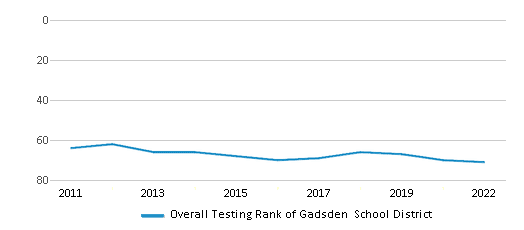
Math Test Scores (% Proficient)
30%
52%
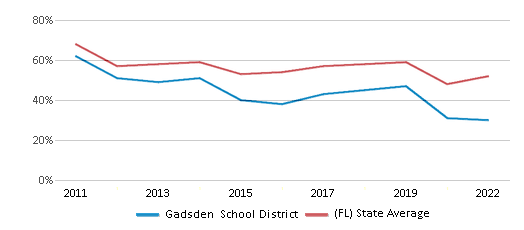
Reading/Language Arts Test Scores (% Proficient)
31%
52%
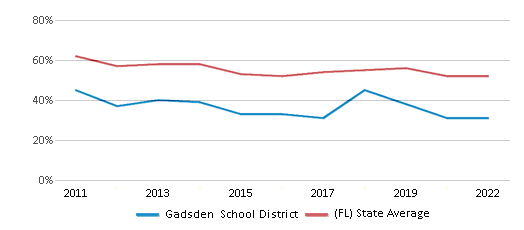
Science Test Scores (% Proficient)
27%
52%
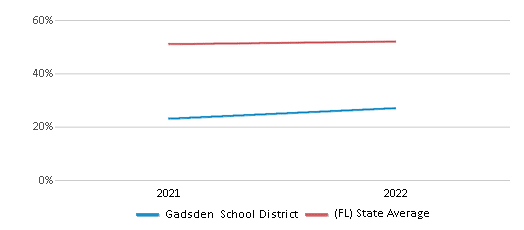
Graduation Rate
76%
87%
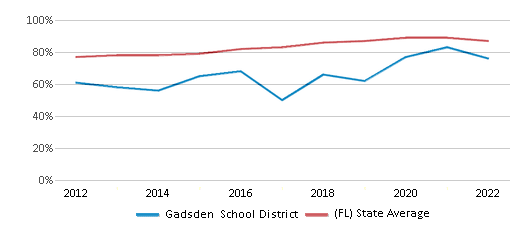
Students by Ethnicity:
Diversity Score
0.45
0.67
# American Indian Students
43 Students
1,018 Students
% American Indian Students
1%
n/a
# Asian Students
5 Students
11,806 Students
% Asian Students
n/a
3%
# Hispanic Students
1,081 Students
184,788 Students
% Hispanic Students
23%
47%
# Black Students
3,334 Students
73,182 Students
% Black Students
71%
18%
# White Students
177 Students
113,159 Students
% White Students
4%
29%
# Hawaiian Students
15 Students
730 Students
% Hawaiian Students
n/a
n/a
# Two or more races Students
50 Students
13,469 Students
% of Two or more races Students
1%
3%
Students by Grade:
# Students in PK Grade:
348
1,935
# Students in K Grade:
375
33,180
# Students in 1st Grade:
375
33,802
# Students in 2nd Grade:
374
33,792
# Students in 3rd Grade:
378
33,836
# Students in 4th Grade:
322
32,634
# Students in 5th Grade:
298
31,149
# Students in 6th Grade:
299
38,407
# Students in 7th Grade:
335
38,336
# Students in 8th Grade:
325
35,557
# Students in 9th Grade:
365
21,185
# Students in 10th Grade:
335
20,972
# Students in 11th Grade:
308
19,947
# Students in 12th Grade:
268
23,420
# Ungraded Students:
-
-
District Revenue and Spending
The revenue/student of $14,737 is higher than the state median of $11,962. The school district revenue/student has stayed relatively flat over four school years.
The school district's spending/student of $13,480 is higher than the state median of $11,615. The school district spending/student has stayed relatively flat over four school years.
Total Revenue
$69 MM
$34,349 MM
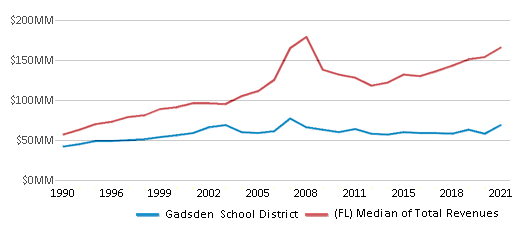
Spending
$63 MM
$33,354 MM
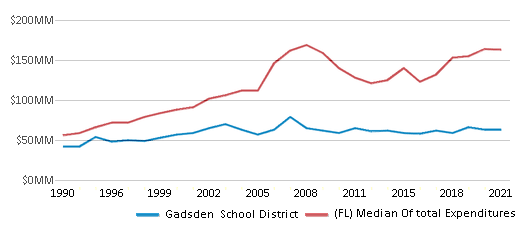
Revenue / Student
$14,737
$11,962
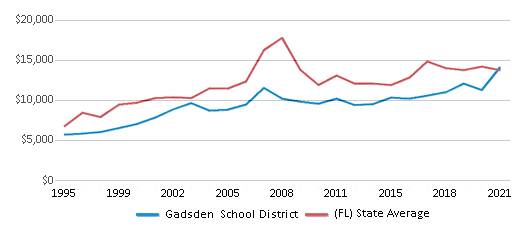
Spending / Student
$13,480
$11,615
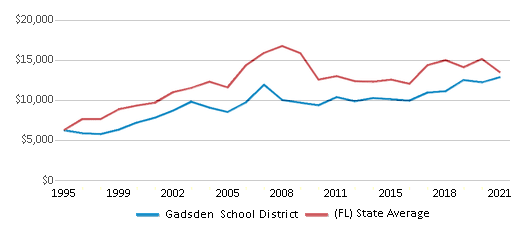
Best Gadsden School District Public Charter Schools (2025)
School
(Math and Reading Proficiency)
(Math and Reading Proficiency)
Location
Grades
Students
Rank: #11.
Crossroad Academy
Charter School
(Math: 42% | Reading: 54%)
Rank:
Rank:
5/
Bottom 50%10
470 Strong Rd
Quincy, FL 32351
(850) 875-9626
Quincy, FL 32351
(850) 875-9626
Grades: PK-12
| 536 students
Recent Articles

Year-Round Or Traditional Schedule?
Which is more appropriate for your child? A year-round attendance schedule or traditional schedule? We look at the pros and cons.

Why You Should Encourage Your Child to Join a Sports Team
Participating in team sports has a great many benefits for children, there is no doubt. In this article you will learn what those benefits are.

White Students are Now the Minority in U.S. Public Schools
Increasing birth rates among immigrant families from Asia and Central and South America, combined with lower birth rates among white families, means that for the first time in history, public school students in the United States are majority-minority. This shift in demographics poses difficulties for schools as they work to accommodate children of varying language abilities and socio-economic backgrounds.





